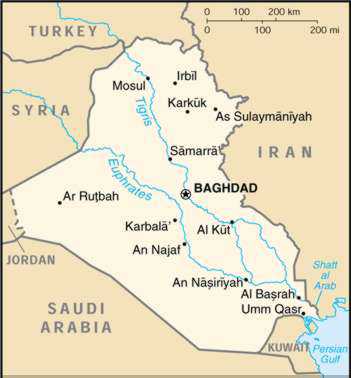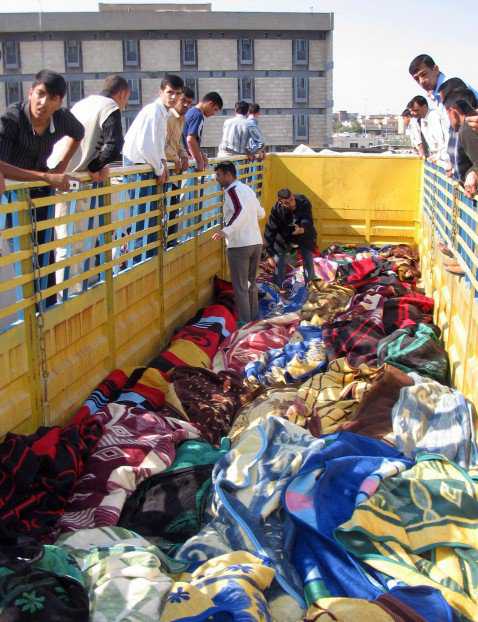Further protests in Algeria, Tunisia and Yemen

The eruption of the Egyptian revolution, in the wake of the Tunisian events, is inspiring populations across the Middle East and North Africa.
Protest over social conditions spread to Iraq this week, as demonstrations broke out in numerous cities. Meanwhile, a mass rally has been scheduled in Algiers for Saturday. In Tunisia itself, the population continues to simmer, with the same autocratic power structures still in place despite the flight of Zine El Abidine Ben Ali. Jordan, Yemen and Morocco are also witnessing protests.
The Iraqi population is beginning to openly register its opposition to the wretched conditions that have been created by eight years of US and allied occupation, as well as bitter sectarian conflict.
Last weekend, protesters stormed government buildings and a police station in Hamza, an impoverished and heavily Shiite community in southern Iraq, to protest shortages of power, food and jobs, as well as political corruption. Security officials allegedly opened fire on the demonstrators, killing one and wounding four others.
The National, from the United Arab Emirates, cited the comment of Abu Ali, who reportedly helped organize the protest: “There will be a revolution of the hungry and the jobless in Iraq, just as there was in Egypt,” he said. “It was a march by the unemployed, by those who have lost hope and who see [Prime Minister] Nouri al Maliki and the new government becoming another dictatorship.”
On February 10, protests of varying sizes took place in Baghdad, Basra, Mosul, Karbala, Diwaniyah, Kut, Ramadi, Samawah and Amara. In Baghdad’s Sadr City, demonstrators took to the streets to protest the lack of public services, unemployment and government corruption. Public sector employees joined residents in the protest. A group of employees from the Ministry of Industry denounced the decision to cut their pay by 20 percent.
In Karbala, residents also demanded an improvement in municipal services and an investigation into the local government. One protest sign read, “We have nothing. We need everything. Solution: Set ourselves on fire”—a reference to the suicide of a young man that ignited the Tunisian upheaval. In Najaf, farmers demanded greater assistance from the government and the resignation of the head of the local government. Demonstrators in Basra explained that changes in food ration policy had left families unable to buy enough food as prices for basics have nearly doubled in recent months.
One of the largest protests Thursday brought some 3,000 lawyers onto the streets of a Sunni Muslim neighborhood in western Baghdad. They called for an end to judicial corruption and prisoner abuse in Iraq’s prisons. The Canadian Press cited the comment of Kadhim al-Zubaidi, spokesman for Iraq’s lawyers’ union in Baghdad: “This is in solidarity with the Iraqi people.… We want the government to sack the corrupt judges.” He added, “We also demand that the interior and defence ministries allow us to enter the [recently exposed] secret prisons…. We want to get information about these prisons.”
In Karbala, the head of the local lawyers’ guild mocked the pittance the government was giving out monthly in place of rations that included cooking oil, rice, flour and sugar. “We reject this amount of money,” said Rabia al-Masaudi, adding, according to Agence France-Presse (AFP), “that MPs were getting paid $11,000 per month, while many of the six million families nationwide who depend on government rations were receiving $12 a month in place of their full supplies.”
On Friday, further protests were held across Iraq. One of the Baghdad protests marched to the Green Zone, where government buildings and embassies are located, calling for an improvement in basic services. According to Reuters, placards carried various messages, including “Where are your electoral promises, food rations and basic services?” and “Tahrir Square Two,” a reference to the events in Cairo.
In Baghdad’s impoverished Bab-al-Sham district last Sunday, one protester, an engineer, told the media, “It is a tragedy. Even during the Middle Ages, people were not living in this situation.” Reuters notes, “Almost eight years after the U.S.-led invasion, Iraq’s infrastructure remains severely damaged. The country suffers a chronic water shortage, electricity supply is intermittent and sewage collects in the streets.”
In Algeria, the security apparatus is preparing for a large demonstration, perhaps in the tens of thousands, planned for February 12 by the National Coordination for Change and Democracy (CNCD)—a grouping of human-rights, unions, and official “opposition” parties tolerated by the regime of President Abdelaziz Bouteflika.
The government has officially banned the march and will reportedly deploy some 30,000 police to block the protest. An opposition spokesman, Said Sadi, told the media that the regime had ringed the capital in an effort to prevent people from participating. “Trains have been stopped and other public transport will be as well,” he said.
The AFP reported: “Large quantities of teargas grenades had been imported, he [Sadi] added. Anti-riot vehicles were seen parked not far from the square where the rally is scheduled to begin on Saturday, and police in uniform patrolled surrounding streets.”
Protests took place in a number of Algerian towns on February 8. In the city of Annaba, 600 kilometers east of Algiers, a hundred unemployed young men protested outside the city’s prefecture and in the streets. In an especially desperate act, in the nearby town of Sidi Ammar, seven jobless men inflicted knife wounds on themselves and threatened a mass suicide outside the town hall.
An Algerian newspaper reports that in the same area, the residents of the village of Raffour also took to the streets. In the last few weeks, around 20 people have attempted to set themselves on fire. Three have died from their injuries.
In Tunisia, where the self-immolation of 26-year-old Mohammed Bouazizi in mid-December helped set off mass protests, a woman set herself on fire Thursday in front of government offices in Monastir, the birthplace of longtime Tunisian dictator Habib Bourguiba. The woman, from Sfax, the second largest city in Tunisia, took the action because of difficulties in obtaining medicine for her husband, afflicted with cancer. She remains in “serious condition” with third-degree burns.
Demonstrations were held in numerous Tunisian cities this week demanding the resignation of officials associated with the Ben Ali regime. In Kasserine, 250 kilometers southwest of Tunis, hundreds of people blocked a main road to call attention to their social problems. In Gafsa also, protesters Tuesday demanded that the new governor step down.
In Yemen, two marches were held Friday in the capital of San’a and in the port city of Aden in solidarity with the Egyptian revolution. Hundreds of young protesters assembled in the afternoon in Aden. According to the Wall Street Journal, “Eyewitnesses said police and protesters scuffled, and about a dozen protesters were arrested. A security official in Aden said the police took action to ensure safety in the city.”
University students in San’a also staged a protest, closing down main roads for about three hours on Friday. They ended their demonstration near the Egyptian embassy. The protest expressed support for the Egyptian people, but also called on US-backed dictator Ali Abdullah Saleh to resign. Protesters denounced the ill treatment and torture of detainees in the secret police headquarters.
In southern Yemen, several thousand people demonstrated Friday in support of secession, and demanded Saleh’s ouster as well. Army tanks, reports Reuters, “rolled into Zinjibar, the capital of Abyan, where suspected Al Qaeda militants have been active and over a thousand protesters gathered on Friday. Hundreds of men sat outside a former South Yemen leader’s home, wearing white shrouds to symbolise their readiness to fight to the death.
“ ’Ali, Ali, catch up with Ben Ali,’ they shouted, implying that Saleh should follow former Tunisian President Zine al-Abidine Ben Ali to exile in Saudi Arabia.”
In Amman, Jordan, two protests took place, one—organized by left organizations—demanding the resignation of the new prime minister, Marouf al-Bakhit, and the second in support of the struggle to topple Mubarak. At the latter, organized by Islamists, Hamzeh Mansour, secretary general of the Islamic Action Front (IAF), the political arm of the Muslim Brotherhood movement, told the crowd, “Arab rulers should listen to the voice of their peoples and stop betting on the United States.”
The Jordanian Farmers Union organized a protest Friday, tossing crates of tomatoes onto the Karak-Aqaba highway to protest dropping prices.
In the Moroccan capital of Rabat on Friday, more than 1,000 protesters rallied to demand public sector jobs. An organizer of the protest told the media that at a meeting January 24, the government had asked for a truce because of the unrest in the region. The truce ended February 10, the government’s deadline for recruiting 4,500 highly qualified graduates. The unemployment rate for university graduates stands at around 18 percent.
According to the communication minister, Khalid Naciri, at least 21 protests daily are being held in Morocco, a nation beset by social inequality and government corruption.
WSWS







